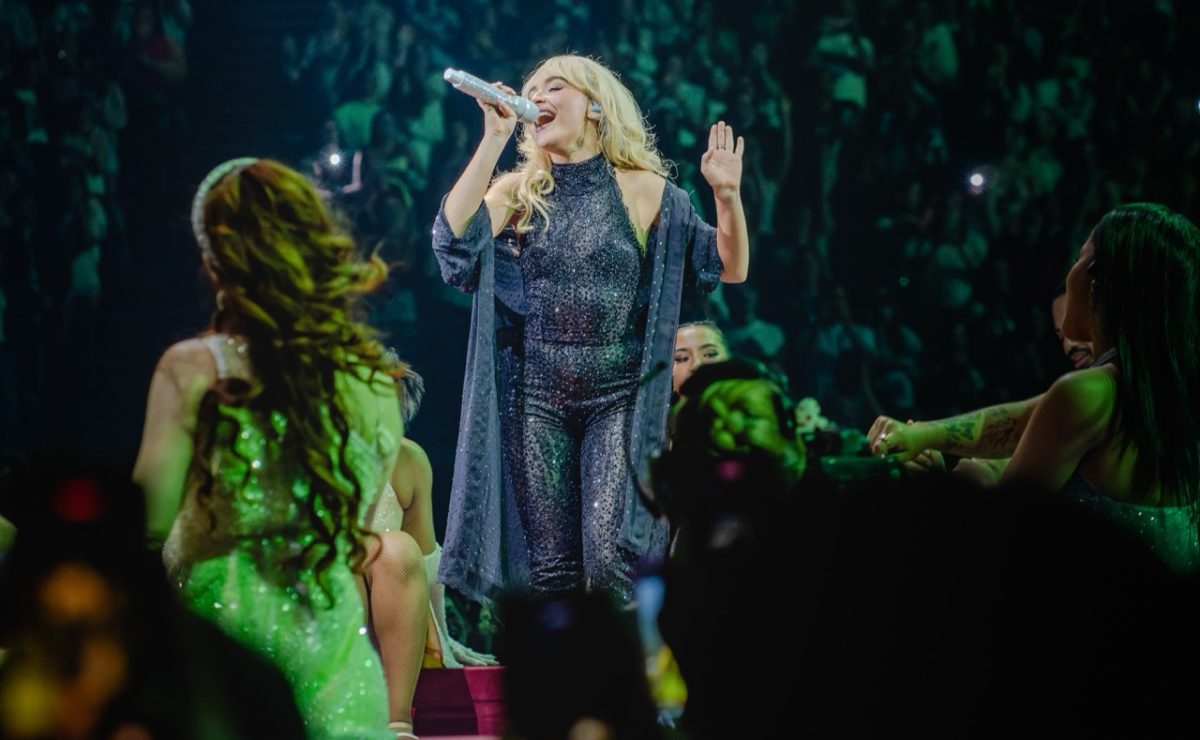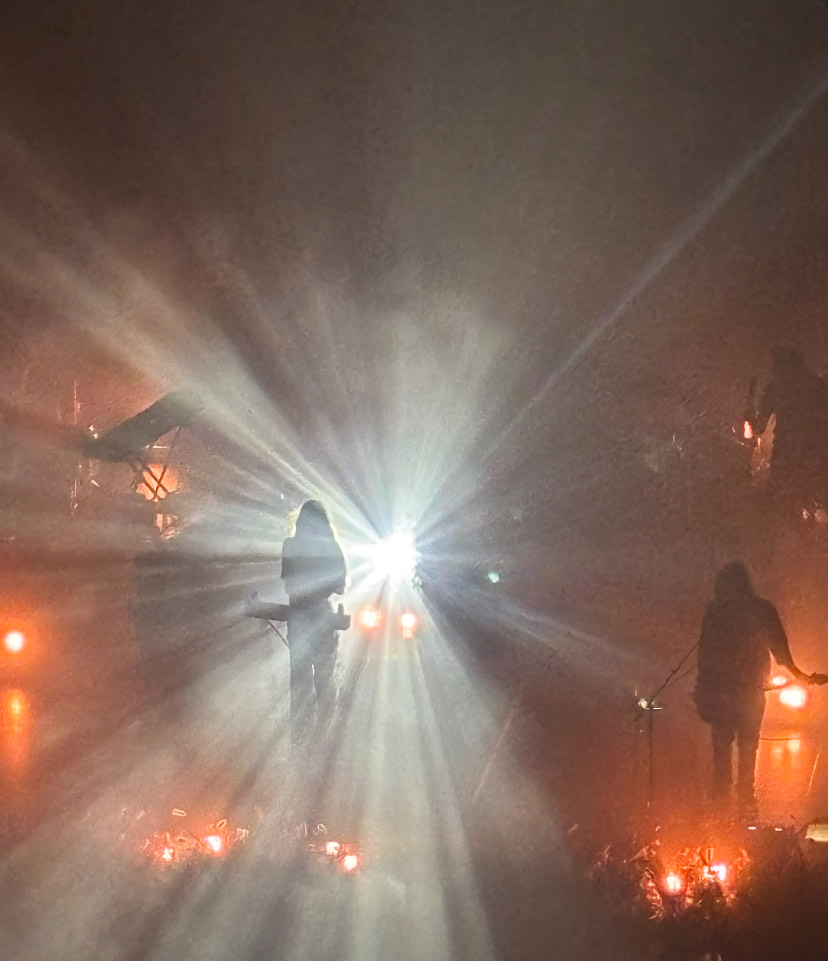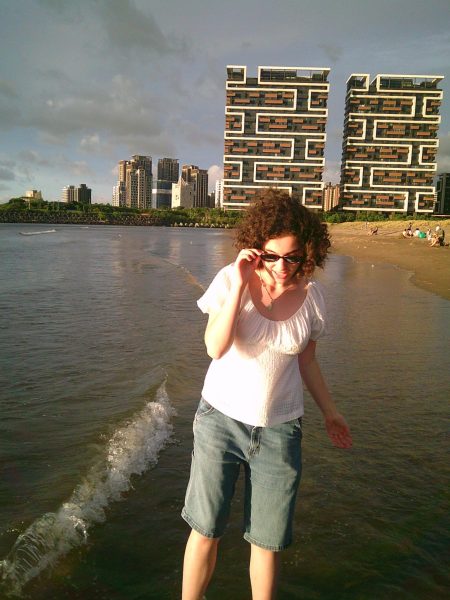Honestly, they don’t look like much: four middle-aged white dudes brandishing sticker-adorned guitars and glasses, with only slight smiles suggesting any form of excitement (despite arriving on the stage via prop spaceship). With no backup dancers, no jumping around on stage, no crowd surfing or mosh pit – they still managed to pack the stadium to its very brim, nostalgia palpable as the audience screams. Standing still with no choreography or fanservice, Weezer began to play – nay, shred – much to fans’ delight. These unassuming nerds are guys you’d probably pass any other day on the street, and they’re putting on a hell of a show.
This is the dichotomy of the rock band Weezer, caught between a memed-to-death “losercore” reputation and critically acclaimed widespread appeal across multiple generations. On our way to the Xcel Center — Weezer’s venue of choice for kicking off their “Voyage to the Blue Planet” tour on Sept. 4 — the cross-generational draw of the band became staggeringly apparent. Lining the streets and the halls of the stadium were millennials holding craft IPAs and matching their flannels to their “Blue Album” shirts, Gen Xers groaning about concession prices with their apathetic teenage children and Gen Z nerds – ourselves included – in Converse, Hot Topic cargo pants and thrifted oversized button- downs, stepping into the concert with a knowing self-awareness for the band’s reputation.
The reactions we got telling people about our plans for the evening ranged from judgmental eyebrow raises and laughter to sincere jealousy. To us, Weezer stands in a gray area of pop culture, with its fans expressing both tongue-in-cheek support and genuine love for the band.
To be fair, the dorky reputation the band has garnered is not without reason: the concert had its own (somewhat ridiculous) plot, a space drama (maybe, we hypothesized, inspired by the lead singer Rivers Cuomo’s own idea for a space-themed rock opera he had in the 90s!) complete with corny cutscenes about needing to “save the blue planet” by playing the entirety of the “Blue Album.” According to the show’s overarching story, Rivers Cuomo is an alien and so are all of us in the audience: the Weezeroids.
But this loose plot was nothing compared to the driving force of the music. The openers The Flaming Lips and Dinosaur Jr first brought energy into the crowd, but Weezer seemed to take it to another level. They started with some hits from their other albums – familiar radio-friendly numbers like “Island in the Sun,” “Beverly Hills” and “Pork and Beans.” After this, much to our surprise (and extreme joy), they moved on to songs from their second album “Pinkerton,” a cult favorite among fans, with a whopping four songs in a row: “Pink Triangle,” “Getchoo,” “Why Bother” and “Across the Sea”. Considering how many of the songs they played have been a public source of shame for Cuomo with their angsty and somewhat juvenile lyrics from his college days, it was a real treat to hear them live.
After these “classics,” they moved to start playing all of the “Blue Album,” kicking the songs off by claiming “the blue planet” as their own, as “one small step for Weezer, one giant leap for Weezerkind!” Here, the audience’s energy multiplied, with recognizable tunes like “Buddy Holly,” “Say It Ain’t So” and “Undone: The Sweater Song” hyping up old and new fans alike. And, in true Weezer fashion, there was no encore nor particularly flashy goodbye: only all six-plus minutes of “Only in Dreams” and a quick, humble thank you and farewell.
But, throughout the concert, we were mostly surprised by how much we knew by heart: even some of the more “deep cuts” had us dancing and singing in our seats just as much as the hits. Although we had found Weezer in different ways – with one of us growing up listening to Weezer in her dad’s car and one of us doing a discography deep-dive during the COVID-19 pandemic – we both shared with each other our fond memories associated with the band, phases in our lives where one specific song was our particular favorite, and the most out-of-pocket lyrics we’ve grown to laugh at and even relate to. It may sometimes be embarrassing to find Cuomo’s words relatable, but it is this very tension that makes being a Weezer fan worthwhile; the fanbase shares and revels in this awkwardness.
All this is to say that there is no one stereotype of a Weezer fan. Sure, it can be hard to overlook the TikTok jokes about it being “incel music,” the iconic “Buddy Holly” riff and (to be fair) the music they’ve released that’s pure garbage (“Raditude,” no matter how ironically you spin it, is an objectively horrible collection of music). But behind that façade of irony lies a band with a dedication to their music, a full embracement of their past rarely seen by other artists, and a deeply passionate fandom from all walks of life. As we listened to the music, sandwiched next to a Millennial couple and a Gen X skater, it became clear Weezer has something for everyone of all ages.
So, although that mosh pit was the stillest one we had ever seen, the overwhelming love radiating from every seat in that stadium made clear the impact of Weezer’s music on us all. Through all the canned dialogue and guitar solos, Weezer managed to unite thousands of people in the stadium and millions around the world, with authenticity and heartfelt energy.








